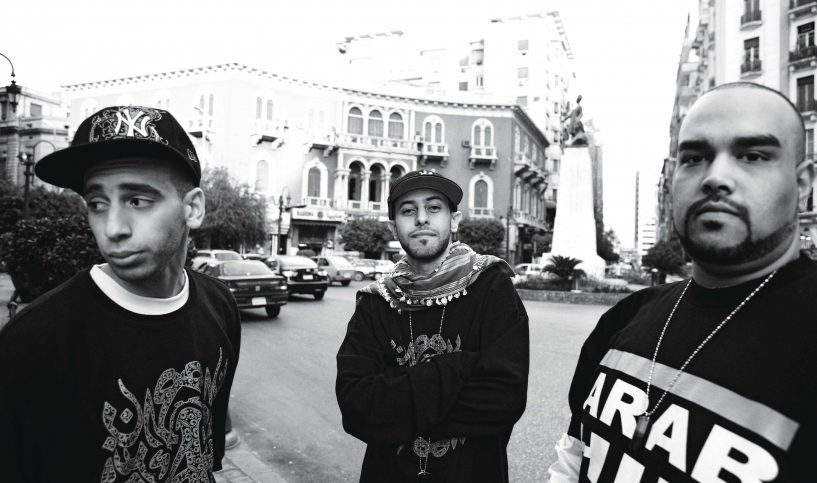Egypt’s most notable hip-hop crew, the Arabian Knightz, is on a mission to spread freedom through their lyrics and incite change with their beats. Their song ‘Rebel’ was the first to play in Tahrir Square in January 2011 after communication lines were restored. The Knightz pride themselves on Arabic unity, with lyrics in both Arabic and English. Their latest album includes production from some notable names such as Fredwreck Nassar and the Wu-Tang Clan’s 4th Disciple. bazaar sits with the founder and originator Karim Adel to find out more.
How did your musical journey begin?
It was in 1999 on a road trip, when I was listening to Jay Z’s new album hit ‘Big Pimpin’’ on my headphones. I heard Abdel Halim’s flutes from Khosara Khosara and I thought to myself, how many hits could an Arab rapper mix out of the millions in our history? I wrote my own lyrics, and produced a song. Soon after, I created the group MaddSkillz and combined my efforts with a few American friends.
We started performing in clubs, and I met Sphinx. Before we spoke we free styled to each other. When we took it outside the whole club followed us and watched us go back to back.
Later he introduced me to our third member, Ehab, a.k.a. E Money. Each of us was in a separate group, but we decided to form Arabian Knightz. Our goal was to show that hip-hop is for everyone. Within 2 weeks we had 3 songs up on MySpace with thousands of views.
What/Who inspires you to compose your music?
Our music is about the people. So, my biggest inspiration is the reality of what is happening in my country and my surroundings. I also draw inspiration from my favorite authors, musicians and movies.
Why did you choose the genre of performing hip-hop music?
Hip-hop reaches people because it gives the freedom to speak, and a non-violent method. Yet, it’s art so it reaches people because it is interesting, without being forceful. People pay more attention to the words of a musician than those of a politician or a sheikh.
What are some of the challenges of performing hip-hop music?
Dealing with show organizers is an ongoing problem in the Middle East. The least of our worries are the frequent technical issues during our shows. Unfortunately, large scale organizers don’t consider Arab rappers as real artists. What is more worrying is our banishment from certain establishments because of our lyrics. Egypt’s Culture Wheel, which was created in Cairo to support freedom of speech through art, has banned others and us from performing there because we did anti-MB songs.
Is the final sound of a musical track an individual or group effort?
It really depends on the track. Usually I get the beat to the guys and we work on it together. Sometimes I get really into the song, and it becomes my full idea like ‘Entrance’ and ‘Unknighted.’ The guys get their own moments of inspiration too, like Sphinx did with ‘Sisters’. But in the end it’s always a group effort. We help each other out to make the best sounds we can.
Who/What in your early beginnings influenced your music?
I remember at the age of five, I took a cruise with my uncle and his car radio played Mohammed Mounirs album Shababeek very loud. I loved the songs and they stuck in my head. My mom would play Abdel Halim and other arabic music in her car just as loud, while she sang along. Music and songs became something you get absorbed into with a passion whether you’re making it, or listening to it. Years passed and nearly in the same age I got into reading poetry, traditional Arab She3r Jahely, I also got into rap music and bought albums by rappers like Ice Cube and 2pac, Snoop and Wu Tang. It was from these new artists and old rhythms and beats that I drew most of my inspiration.
In your opinion, what was the hardest challenge you faced in your musical career so far?
The hardest part is getting your career off the ground, with no support from the industry, or media. We’ve played shows all over Europe with no local coverage, despite our attempts to let them know we’re playing. Our albums have been banned, and so we don’t have a booking agent, manager or promoter.
How has the Middle Eastern world reacted to your sound?
We have a huge fan base all over the Middle East. Our web hits show they span from Morocco to Oman. We really want to go all over the region by tour bus and perform everywhere, but so far we’ve only done Egypt and Qatar.
Do you feel that music should always serve a specific purpose?
Music is music and it follows no rules. It’s a personal form of expression so it’s there to express how I feel at the time. Sometimes I just want to make songs that make me feel good or silly.
What are some of your favorite tracks, and why?
Every song we did has its place in our heart and I can’t pick one, they are all my babies. Each one took our music to a different level.
What is your dream performance space and destination?
I want to perform in the Bronx where they created hip-hop and in Saudis Souk Okaz where they created poetry battles 2000 years ago. But for now, next year’s World Cup.
What would you like to accomplish in the future?
I want to push hip-hop in the Middle East to a global standard, so I can show the real image of this region to the world for once, and they know the truth about who and how we are.
Will hip-hop visit us in Kuwait?
I’d love to visit! I’ll come there as soon as I can book a show and stay as long as we are wanted. I hear it’s a beautiful country.
You can download the album from Amazon at http://tinyurl.com/4amazon11 or from iTunes at http://tinyurl.com/Itunes-usa-album. Follow the group on Twitter @ARABIANKNIGHTZ or Facebook at www.facebook.com/ARABIANKNIGHTZ.AK or email them at arabian.knightz.eg@gmail.com








